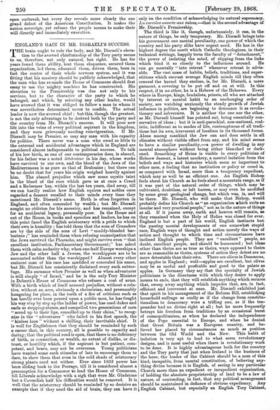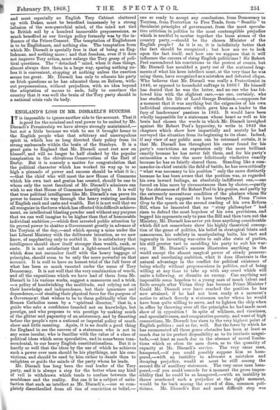ENGLAND'S GAIN IN MR. DISRAPTJ'S SUCCESS.
THE brain ought to rule the body, and Mr. Disraeli's eleva- tion to the avowed chieftainship of the Tory party seems to us, therefore, not only natural, but right. He has for years found them ability, lent them eloquence, secured them organization, led them, educated them, driven them, been in fact the centre of their whole nervous system, and it was fitting that his mastery should be publicly acknowledged, that the man who has re-made the House of Commons should first essay to use the mighty machine he has constructed. His elevation to the Premiership was due not only to his services, but to the character of the party to which he belonged, and which, by selecting any other leader, would have avowed that it was obliged to follow a man in whom it was nevertheless determined never to confide. The actual leader is now the avowed chief ; but this, though the greatest, is not the only advantage to be derived both by the party and the country from Mr. Disraeli's success. It will pour new life into the veins of every political aspirant in the kingdom, and they were grievously needing reinvigoration. If Mr. Disraeli may be Premier, so may any man with his capacity for politics. There never was a man who owed so little to the external and accidental advantages which in England are considered almost indispensable to political success. To talk of his low birth, as one of our contemporaries does, is absurd, for his father was a noted litterateur in his day, whose works have survived to our own, and the blood of the Jews of the Mediterranean is as pure as that of Brahmins ; but there can be no doubt that for years his origin weighed heavily against him. The absurd prejudice which saw some mystic taint in the blood of the race which gave us at once a Creed and a Redeemer has, -within the last ten years, died away, till we can. hardly realize how English squires and nobles once regarded a descent recalled to their minds every time they mentioned Mr. Disraeli's name. Birth is often forgotten in England, and often concealed by wealth ; but Mr. Disraeli sought no oblivion for his ancestry, and has remained, except for an accidental legacy, personally poor. In the House and out of the House, in books and speeches and leaders, he has on this point faced the English aristocracy with a pride to which their own is humility ; has told them that the sons of Crusaders are by the side of the sons of Levi " muddy-blooded bar- barians ;" has reminded them when refusing emancipation that the Jews survived the Pharaohs, and might survive even " that excellent institution, Parliamentary Government;" has asked them with calm audacity why, when one-half Europe worships a Jew and the other half a Jewess, the worshippers are to be accounted nobler than the worshipped ? Almost every other eminent man of his race has modified or concealed his name, but Mr. Disraeli has consistently disdained every such subter- fuge. His surname when Premier as well as when adventurer is still simply " of Israel," and he is the only Tory Minister in Debrett's House of Commons who refuses a coat of arms. With a birth which of itself aroused prejudice, without a rela- tive, without an acre, obviously a rhetorician, and presumably hungering for place, in the teeth of a fire of criticism such as has hardly ever been poured upon a public man, he has fought his way step by step up the ladder of power, has used dukes and earls as stepping-stones, and compelled two generations of men " acred up to their lips, consolled up to their chins," to recog- nize in the " adventurer " who failed in his first speech, the "kinless loon " without a shilling, their inevitable chief. It is well for Englishmen that they should be reminded by such a career that, in this country, all is possible to capacity and daring; that the political road is open, that there is no deficiency of birth, or connection, or wealth, no extent of dislike, or dis- trust, or hostility which, if the aspirant is but patient, com- petent, and brave, may not be overcome. Young politicians have wanted some such stimulus of late to encourage them to dare, to show them that even in the cold shade of aristocracy strong plants need not wither. Ever since 1832 power has been sliding back to the Peerage, till it is considered almost a presumption for a Commoner to lead the House of Commons, till Liberals acknowledge with a sigh that were Mr. Gladstone but a Cavendish half his difficulties would be removed. It is well that the aristocracy should be reminded by so decisive an example that if they need the aid of brain, they can have it
only on the condition of acknowledging its natural supremacy._ La carri&e ouverte aux talens,—that is the second advantage of Mr. Disraeli's Premiership.
The third is like it, though, unfortunately, it ean, in the- nature of things, be only temporary. Mr. Disraeli brings into- his government one mental peculiarity, one power of which the country and his party alike have urgent need. He has in the highest degree the merit which Catholic theologians, in their technical writings, happily term the faculty of " detachment," the power of isolating the mind, of slipping from the links. which bind it so closely to the influences around. He can go mentally " into retreat " whenever retreat is advis- able. The vast mass of habits, beliefs, traditions, and super- stitions which encrust average English minds till they often conceal the kernel they enclose, is, for Mr. Disraeli, a mere garment, a covering to be put off and on at will. In this. respect, if in no other, he is a Hebrew of the Hebrews. Every where in Europe, kings, feudalists, priests, all who are attached by interest or mental habit to an unchanging order of society, are watching anxiously the steady growth of Jewish influence in politics, are beginning to denounce it as revolu- tionary and subversive. It is neither the one nor the other, as Mr. Disraeli himself has pointed out, being essentially con- servative of ideas ; but it is anti-parochial, non-national, real- istic, indifferent as to modes of life, contemptuous of all tradi- tions but its own, irreverent of localism in its thousand forms. Alone among mankind the Jew can and does settle in all climates without visible effect from any, and his mind seems. to have a similar peculiarity,—a power of dwelling in any mental atmosphere without being either blanched or dark- ened. Something of Heine is visible in every politician of Hebrew descent, a latent mockery, a mental isolation from the beliefs and ways and histories which seem so important to. other men, a feeling that no institution or policy or creed is, as compared with Israel, more than a temporary expedient, which may as well be an efficient one. An English Bishop feels about his Church as he feels about a mountain range, as if it was part of the natural order of things, which may be- cultivated, doubtless, or left barren, or may even be modified by some great geological change, but which was, is, and will be there. Mr. Disraeli, who will make that Bishop, would probably define his Church as " an organization which suits an insular and very practical people," not as in the nature of things. at all. If it passes away, earth and heaven will remain, as- they remained when the Holy of Holies was closed for ever. England is but a part of his world, English instincts but- the passing mental developments of one somewhat stupid race, English ways of thought and action merely the ways of action and thought to which time and circumstances have inclined English people. They are " excellent " people, ncr doubt, excellent people, and should be humoured ; but ideas. other than theirs are as true as theirs, ways opposed to theirs are as reasonable as theirs, systems of action they detest are no- more detestable than their own. There are olives in Damascus, and apples in England ; well—apples are excellent, but olives may be as useful and profitable and good to the palate as apples. In Germany they say that the specialty of Jewish politicians is the directness with which they desire to apply means to ends, that they will establish anything which secures. that, sweep away anything which impedes that, are, in fact, efficient and irreverent at once. Mr. Disraeli exhibited just that spirit in his management of the Reform Bill, establishing household suffrage as coolly as if the change from constitu- tionalism to democracy were a trifling one, as if the ten- pounder had no divine right at all ; but he more frequently betrays his freedom from traditions by an occasional burst of cosmopolitanism, as when he declared the independence- of the Pope essential to Europe, and when he denied that Great Britain was a European country, and be- lieved her placed by circumstances as much as position between the Old World and the New. This habit of isolation is very apt to lead to what seem revolutionary designs, and is most useful when there is revolutionary work to be done. It is highly advantageous both for the country and the Tory party that just when Ireland is the business of the hour, the leader of the Cabinet should be a man of this. kind, incapable, from mental constitution, of believing any- thing divine because it is English, of seeing in any particular Church more than an expedient or inexpedient organization, of holding the absolute proprietorship of land to be a law of nature, of contending, in fact, that any political arrangement should be maintained in defiance of obvious expediency. Any English Cabinet, but especially an English Tory Cabinet,
and most especially an English Tory Cabinet cluttered up with Dukes, must be benefited immensely by a strong infusion of the non-parochial mind, of the mind not tied to British soil by a hundred immovable prepossessions, as much benefited as our foreign policy formerly was by the in- fluence of the Prince Consort. The temptation of Englishmen is to be Englishmen, and nothing else. The temptation from which Mr. Disraeli is specially free is that of being an Eng- lishman, and nothing more ; and that freedom, even if it does not improve Tory action, must enlarge the Tory grasp of poli- tical questions. The " detached " mind, when it does things, almost always does them in a large way, sparing nothing un- less it is convenient, stopping at nothing unless the exertion seems too great. Mr. Disraeli has only to educate his party on Irish questions as he has educated them on Reform, with- out prepossessions, without prejudices, with no idea beyond the adaptation of means to ends, fully to convince the country that it was well the brain of the Tory party should in a national crisis rule its body.































 Previous page
Previous page